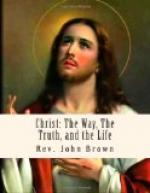I come to speak a little to the last case which I shall handle, which is,
CHAPTER XVIII.
HOW WE SHALL MAKE USE OF CHRIST AS THE TRUTH, THAT WE MAY WIN TO RIGHT AND SUITABLE THOUGHTS OF GOD.
This is a case that much troubleth the people of God,—they cannot get right and suitable thoughts of God, which they earnestly desire to have, nor know not how to win at them; and certain it is, he only who is the Truth, and came out of the bosom of the Father, can help here. Therefore for our use-making of him for this end, it would be remembered,
1. That the mind of man, through the fall, is nothing but a mass of ignorance and blindness; that “the understanding is darkened,” Eph. iv. 17, 18; “and naturally we are in darkness,” 1 John ii. 9, 11; “yea, under the power of darkness,” Col. i. 13; and, which is more, our minds are naturally filled with prejudice against God, and enmity, through wickedness naturally residing there, and which the prince of the power of the air, the spirit which worketh in the children of disobedience, increaseth and stirreth up.
2. That this evil is not totally taken away, even in the godly, but helped only in part; for they see and know but in part, 1 Cor. xiii. 13.
3. That hence it cometh to pass, that through the working of corruption, the soul of a believer can sometimes win to no right thought of God at all; or at best to some very narrow and unsuitable conceptions of him and his ways; yea, sometimes, all the thoughts they can get of God are vain and idle, if not misshapen and blasphemous.
4. That as we are, we cannot see God; “for no man hath seen him,” Matt. xi. 27. John iv. 46; for he is an invisible God, 1 Tim. i. 17. Heb. xi. 27. “He dwelleth in light which no man can approach unto. Him no man hath seen, nor can see,” 1 Tim. vi. 16. 1 John iv. 12.
5. That all that knowledge of God which is saving, is to be found in Christ, who is the “brightness of his glory, and the express image of his person,” Heb. i. 2; “and the image of the invisible God,” Col. i. 15; and is for this end come out from the bosom of the Father, that he might acquaint us with him, and with all his secrets, John i. 18. Matt. xi. 27, so far as is needful for us to know. He is God incarnate, that in him we may see the invisible. Thus “God is manifest in the flesh,” 1 Tim. iii. 16; “and the Word was made flesh, and dwelt among us,” John i. 14.




